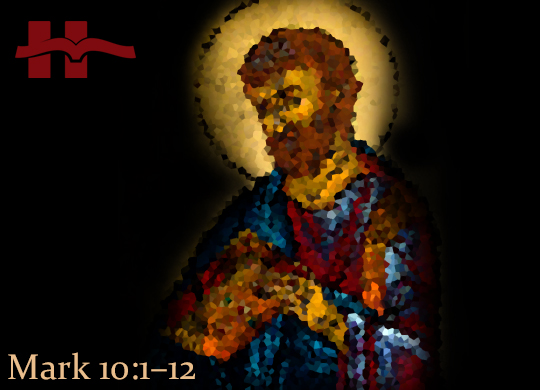Mark 10:1–12

Followers of Jesus, in obedience to Scripture, remain united to their spouses for life, in the journey of discipleship.
“And the two shall become one flesh.”
Mark 9:35
In Mark 3:31–35 and 10:28–30, Jesus had declared that a new family was being formed, that related to him, that followed him, and that represented him. Questions would have arisen then regarding the implications of this new unit of relationship for the already-existing unit of the traditional family: What part did marriage and children play in the life of the disciple? Did Jesus’ own example of “rejecting” mother and brothers have to be taken as models for others? And when he urged the sacrifice of everything “for My sake” (10:28–31), did that mean spouses, as well?
Lest lest anyone suspect that the sacrifice of everything that Jesus called for in 10:28–31 included spouses, Jesus makes an authoritative pronouncement: he is anti-divorce, for any reason, and a married couple is one flesh (10:1–12).
Radical journeys call for radical measures. New kingdoms call for new constitutions. The disciple is to take up his cross and deny himself to follow Christ. But for those married, a rewriting of this principle was appropriate: “he+she” (as one flesh) will have to take “his+her” cross and deny “himself+herself” as “he+she” follows Jesus in discipleship. The “one flesh” concept is foundational to marriage and foundational it will remain for discipleship, as well.
The spousal relationship, as is established in this pericope, is one ordained by God and is inviolable. The call to discipleship does not disrupt that unique bond. How could it? For husband and wife have become “one flesh,” inseparable (10:8–9). In fact, for married folks, the Trip of Discipleship calls for a “one-fleshed” undertaking—a joint enterprise. There is never any indication in Scripture of it being otherwise. And in this pericope, Jesus makes that principle explicit.
Jesus is clear: divorce is not good. However, in his statement in Mark 10, there is no explicit mention of any grounds for divorce whatsoever. What Mark is doing is establishing firmly the crucial importance of “one-fleshedness” in the economy of God and for the purposes of discipleship. By not giving any exceptions, Mark is underscoring this crucial concept of spousal unity and oneness. And so we have a stunning demand by Jesus for lifelong monogamy and fidelity.
Deuteronomy 24:1–4, the passage referred to in Mark 10:4, does not command or even explicitly permit divorce; it assumes the situation and attempts to regulate it, preventing spousal abuse after a divorce has occurred. The divorce itself is not a matter of discussion for the purposes of this commandment—it is neither permitted nor proscribed, but simply assumed to have happened. As Jesus teaches, divorce is thus not necessarily compulsory, but merely a permission because of hardheartedness (10:5).
Jesus proceeds to show what Moses actually commanded—his text of recourse is Gen 1:27 and 2:24. The imagery of unified, single flesh. And then by redefining divorce as enabling and facilitating adultery, Jesus conclusively condemns divorce as a violation of God’s will revealed in Scripture (10:6–12). It is not simply that this “one flesh” should not be separated; Jesus is saying that it cannot.
Following Jesus is a radical step, and radical steps call for radical measures and changes in worldview. This pericope is a call to a corresponding radical lifestyle in the important facet of marriage, commensurate with the revolutionary call of discipleship. Discipleship, for a married person, is no longer a solo option; it is a one-fleshed duet.












 Abe Kuruvilla is the Carl E. Bates Professor of Christian Preaching at The Southern Baptist Theological Seminary (Louisville, KY), and a dermatologist in private practice. His passion is to explore, explain, and exemplify preaching.
Abe Kuruvilla is the Carl E. Bates Professor of Christian Preaching at The Southern Baptist Theological Seminary (Louisville, KY), and a dermatologist in private practice. His passion is to explore, explain, and exemplify preaching.
2 Comments
1) How would you interpret the exception in Mt 5:32 & 19:9?
2) While I would hold to “No divorce” as God’s will and design, it remains a challenge in pastoral leading and counselling practically. Recently, I heard David Pawson’s views on Divorce and Remarriage (chk: http://davidpawson.org/; & his book “Remarriage is Adultery unless…”). He holds and teaches “No Divorce, No Remarriage”. Since Re-marriage constitutes adultery, one who continues in a re-married state is basically continuing in sin, regardless Christian or non-Christian, regardless whether the divorce happened before one’s conversion to Christ or not. He is strict to the view that repentance means to stop continuing in sin, and therefore to stop one’s state of remarriage. What is your response to this?
Good question, but probably not one that can be dealt with sufficiently here. There is no question Jesus provided exceptions, as you note.
My hermeneutic pays attention to what Mark is doing. What he is doing here is emphasizing with great intensity the seriousness of marriage and one-fleshed discipleship. So he omits the exception clauses of Jesus. An overall construction of the biblical theology of marriage would, of course, include the exceptions into the broad scheme. All Mark is doing here is underscoring the critical nature of avoiding divorce; he doesn’t necessarily deny the exceptions (and so neither can we).